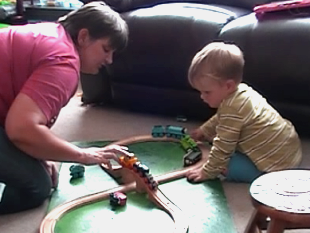April 11, 2013 report
Study finds sighted babies of blind mothers find other ways to bond

(Phys.org) —A unique study carried out by researchers from the U.K., Australia and Canada has revealed that babies born to blind mothers don't appear to suffer degraded communication skills compared to babies born to sighted mothers. In their paper published in Proceedings of the Royal Society B, the researchers found that not only did the babies of blind mothers perform as well as did babies born to sighted mother's on standard communication tests, but appeared to develop some advantages as well.
People staring into one another's eyes is a well known form of communication, and has no doubt been observed between babies and mothers throughout human history. It's a demonstrated means of bonding—babies that go without, such as those in an orphanage have been found to lack communication and social skills. But what happens when the mother is blind? Without eye-locking, do such babies develop any differently than babies with sighted mothers? That's what the team members on this new effort sought to discover.
To find out, they enlisted the assistance of five babies and their blind mothers. Each of the babies was tested for their communication skills at ages 6-10, 12-15 and 24-47 months. Babies were observed with their mothers and while watching videos of other women communicating—their eye movements were also tracked using face scanning technology. In all of the tests, the five babies were found to have communication skills comparable to babies born to sighted women, and even in some instances, appeared to have gained some advantages, such as better visual memory retention and quicker response times to changing images. It's all due, the researchers speculate, to both the way the blind mother's interact with their babies in non-visual ways, and the innate plasticity of the human brain.
Interestingly, the babies tested appeared to also have developed separate communication skills for different people—when communicating with their blind mothers, for example, they used more verbal sounds than they did when trying to communicate with other people, such as their sighted father. The researchers compare this kind of adaption to babies that grow up in bilingual homes. Such babies gain a cognitive boost and as a result oftentimes become better communicators.
More information: The importance of the eyes: communication skills in infants of blind parents, Published 10 April 2013 doi: 10.1098/rspb.2013.0436
Abstract
The effects of selectively different experience of eye contact and gaze behaviour on the early development of five sighted infants of blind parents were investigated. Infants were assessed longitudinally at 6–10, 12–15 and 24–47 months. Face scanning and gaze following were assessed using eye tracking. In addition, established measures of autistic-like behaviours and standardized tests of cognitive, motor and linguistic development, as well as observations of naturalistic parent–child interaction were collected. These data were compared with those obtained from a larger group of sighted infants of sighted parents. Infants with blind parents did not show an overall decrease in eye contact or gaze following when they observed sighted adults on video or in live interactions, nor did they show any autistic-like behaviours. However, they directed their own eye gaze somewhat less frequently towards their blind mothers and also showed improved performance in visual memory and attention at younger ages. Being reared with significantly reduced experience of eye contact and gaze behaviour does not preclude sighted infants from developing typical gaze processing and other social-communication skills. Indeed, the need to switch between different types of communication strategy may actually enhance other skills during development.
Journal information: Proceedings of the Royal Society B
© 2013 Phys.org
















